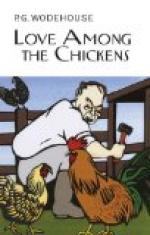It appeared that he had not come well out of the matter of the accident. I had not looked at it hitherto from his point of view. While the rescue had left me the popular hero, it had had quite the opposite result for him. He had upset his boat and would have drowned his passenger, said public opinion, if the young hero from London— myself—had not plunged in, and at the risk of his life brought the professor ashore. Consequently, he was despised by all as an inefficient boatman. He became a laughing-stock. The local wags made laborious jests when he passed. They offered him fabulous sums to take their worst enemies out for a row with him. They wanted to know when he was going to school to learn his business. In fact, they behaved as wags do and always have done at all times all the world over.
Now, all this, it seemed, Mr. Hawk would have borne cheerfully and patiently for my sake, or, at any rate for the sake of the crisp pound note I had given him. But a fresh factor appeared in the problem, complicating it grievously. To wit, Miss Jane Muspratt.
“She said to me,” explained Mr. Hawk with pathos, " ’Harry ‘Awk,’ she said, ‘yeou’m a girt fule, an’ I don’t marry noone as is ain’t to be trusted in a boat by hisself, and what has jokes made about him by that Tom Leigh!’ "
“I punched Tom Leigh,” observed Mr. Hawk parenthetically. " ‘So,’ she said me, ‘you can go away, an’ I don’t want to see yeou again!’ "
This heartless conduct on the part of Miss Muspratt had had the natural result of making him confess in self-defence; and she had written to the professor the same night.
I forgave Mr. Hawk. I think he was hardly sober enough to understand, for he betrayed no emotion. “It is Fate, Hawk,” I said, “simply Fate. There is a Divinity that shapes our ends, rough-hew them how we will, and it’s no good grumbling.”
“Yiss,” said Mr. Hawk, after chewing this sentiment for a while in silence, “so she said me, ‘Hawk,’ she said—like that—’you’re a girt fule——’ "
“That’s all right,” I replied. “I quite understand. As I say, it’s simply Fate. Good-bye.” And I left him.
As I was going back, I met the professor and Phyllis. They passed me without a look.
I wandered on in quite a fervour of self-pity. I was in one of those moods when life suddenly seems to become irksome, when the future stretches black and grey in front of one. I should have liked to have faded almost imperceptibly from the world, like Mr. Bardell, even if, as in his case, it had involved being knocked on the head with a pint pot in a public-house cellar.




